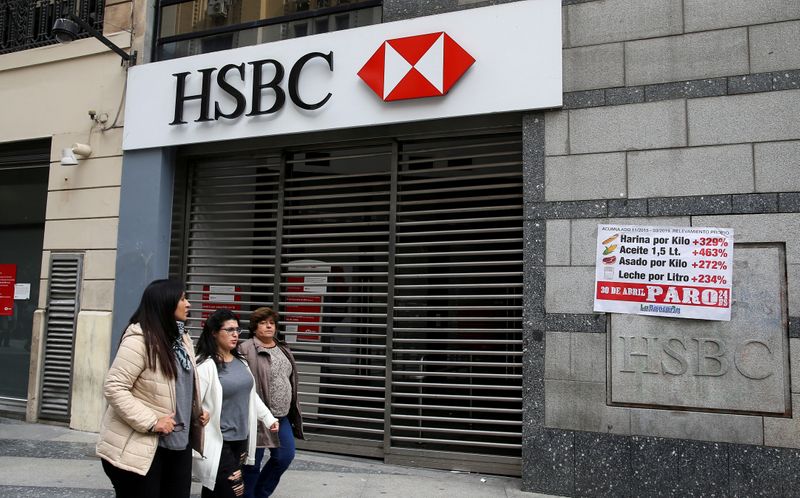By Simon Jessop, Milla Nissi and Sarah Morland
LONDON/GDANSK (Reuters) - As companies cut dividends in response to the financial havoc caused by the coronavirus, fund managers whose portfolios rely on the payouts are sifting for those most likely to deliver a sustainable yield when the world recovers.
Nearly 70 of the top 600 listed companies in Europe cut or suspended dividends between Feb. 24 and March 31, a Reuters analysis found, while 18 of the top 100 London-listed companies have cut or delayed theirs.
By March 30, 12 S&P500 (SPX) firms had reduced or suspended their dividends, according to Goldman Sachs (NYSE:GS).
The latest to rip up dividend plans include some of Europe's top banks, such as HSBC (L:HSBA) and Lloyds Banking Group (L:LLOY), after pressure from regulators. Globally, the roll call of dividend-cutting companies straddles sectors, from aircraft maker Boeing (N:BA) to automaker Ford Motor Company (N:F), and advertising giant WPP (L:WPP).
The pressure is also growing on other leading dividend payers, notably in the energy sector, whose earnings are being hit by deep oil price falls as coronavirus lockdowns destroy demand and supplies swell. [O/R]
"Companies can plan for a recession - it's tough but provisions can be made. However, this environment is much more extreme with many businesses facing prolonged periods without revenue," said Ben Whitmore, who runs several funds at Jupiter Asset Management, including the Jupiter Income Trust.
"We have stress-tested the portfolio and made some sales of businesses where the balance sheet can't cope with this stress."
The wave of dividend cuts raises a question mark over mutual funds whose entire strategy is based on harvesting income streams to pay their clients and is an increasingly popular play with retail investors seeking a steady stream of returns.
Between 2018 and 2019, European-based global income funds saw their assets rise by 21% to 90.2 billion euros ($99.25 billion), data from Morningstar showed.
For now, income fund managers say all they can do is focus on companies that may still need to cut payouts to preserve cash in the short run, but are likely to weather the expected sharp downturn.
"For our portfolio, the key at the moment is the protection of capital and ensuring that the fund is best placed for when we come out of the tunnel. Being in a strong position for capital growth will mean the medium-term position for income will be strong," Chris Murphy, manager of the Aviva (LON:AV) Investors UK Equity Income Fund, said.
He said he had added to positions in insurer Prudential (L:PRU) and money manager Schroders (L:SDR).
Graphic: European companies ditch dividends to save cash, https://fingfx.thomsonreuters.com/gfx/editorcharts/yxmvjkblprz/eikon.png
For an interactive version of the graphic, click here https://reut.rs/2UtM7NY.
There are signs income funds are feeling the strain more than others. By March 25, the value of assets in British dividend funds - which totalled around 43 billion pounds ($53.16 billion) at the start of the month - had fallen by an average 30.2%, against 25.3% for the FTSE All Share according to data from Morningstar, although to-date, there have been no fund closures.
European dividend futures show markets pricing in a 45% cut to dividends in 2020 with a further significant fall in 2021, Nicolas Simar, Senior Portfolio Manager Euro & European High Dividend, said.
"This seems overdone to us," Simar said. "As a comparison, dividends fell around 30% in Europe during the great financial crisis (of 2007-8), and for an average recession, the figure is about 10%.
"While there is not much that is average about the current situation, it's not obvious to us that the end point, from a dividend perspective, should be half again as bad as the 2008 crisis."
Refinitiv data shows analysts expect STOXX Europe 600 dividend payouts to fall by around $10 billion over the next 12 months.
Graphic: Analysts see $10 billion in dividend cuts for Europe, https://fingfx.thomsonreuters.com/gfx/buzz/oakveqmlvrd/Pasted%20image%201585657663923.png
In the United States, Goldman Sachs analysts said they expected "a wave of dividend suspensions, cuts, and eliminations" to drive down dividends by 38% over the next nine months, for a full-year slide of 25% below last year's payout level.
Matthew Jennings, Equity Income Investment Director at Fidelity International, said the unique circumstances surrounding this round of dividend cuts should offer some solace to investors, especially if a temporary conservation of cash ensures a stronger recovery.
With an estimated one-third of the world's population in lockdown, and political pressure building in some countries for companies to show restraint, it was vital to work out which companies had suffered a long-term hit to value, he said.
"A dividend cut in normal circumstances can be a signal of a business that has been poorly managed or is in structural decline. However, this is not necessarily the case today," Jennings said, adding the firm backed the deferral of bank sector dividends.
"We have no automatic knee-jerk reaction to a dividend cut in the portfolio. In many cases a dividend cut today will be in the long-term interests of shareholders and aid a speedy recovery on the other side of the pandemic."
